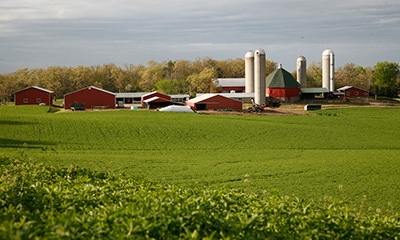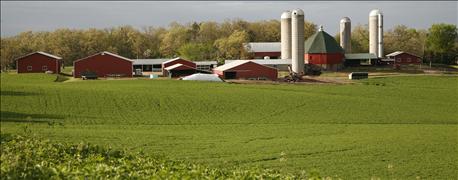October 8, 2015

Imagine that that a fire has destroyed all of some or all of your farm's machinery and livestock. Once the shock is over, many farmers are surprised to learn that the receipt of an insurance recovery for a fire or other casualty loss may result in taxable income. Fortunately, there are ways to reduce such taxes.

As you are likely aware, the sale of a piece of machinery or purchased livestock usually results in taxable income.
Understanding the problem
As you are likely aware, the sale of a piece of machinery or purchased livestock usually results in taxable income. For example, Mr. and Mrs. Farmer purchase a tractor for $100,000. Mr. and Mrs. Farmer sell the tractor three years later for $75,000. During their three years of ownership, Mr. and Mrs. Farmer took depreciation deductions on their tax return totaling $60,000, leaving an adjusted basis of $40,000 for the tractor. Even though the tractor is sold for $25,000 less than its original purchase price, Mr. and Mrs. Farmer will realize $35,000 of taxable gain on the sale ($75,000 sale price less adjusted basis of $40,000).
Imagine instead of selling the farm tractor, Mr. and Mrs. Farmer's tractor is destroyed by a fire. Mr. and Mrs. Farmer receive a check from their insurance company for $75,000, which was the tractor's fair market value at the time of the fire. As shown above, the "gain" on this insurance recovery would also be $35,000 - - the difference between the insurance recovery and the tractor's depreciated tax basis.
Like kind exchange
In order to minimize the tax on the receipt of insurance proceeds due to the destruction of farm personal property, a personal property like-kind exchange may be considered. The "like-kind" requirement is narrower in a personal property exchange than in a real property exchange. For example, in a real property exchange, a bare parcel of crop land could be exchanged for an apartment building.
In personal property exchanges, the relinquished property and the replacement properties must be of "like-class." The IRS publishes a table called the North American Industry Classification System which shows the various classes of assets. For example, beef cattle have a NAICS number of 112111 and dairy cattle have a NAICS number of 112120 and could not be exchanged with one another. Livestock of one sex is also not like-kind to livestock of the other sex. The classes for farm machinery items are generally broader than for livestock.
~~~PAGE_BREAK_HERE~~~
A farmer desiring to defer tax on casualty loss insurance proceeds must make this election on his tax return in the year of the insurance recovery. The replacement property must generally be purchased within a two-year period beginning at the end of the year of the insurance recovery. In contrast, a farmer desiring to defer taxes on a sale of farm real or personal property has up to 180 days to acquire like-kind replacement property measured from the day the relinquished property is sold.
Tax planning
In a like-kind exchange, taxes are being deferred for an indefinite period of time until the replacement property is later sold. Often, rather than delaying paying taxes for an indefinite period of time, it can be beneficial to pay some tax in one year and some tax in the following year. This is primarily because of the graduated income tax rates and/or additional taxes for higher income taxpayers. This planning may occur by doing something similar to the following:
Suppose that Mr. and Mrs. Farmer are discontinuing dairy farming in 2015 due to a fire and sell $250,000 of hay forage equipment on Nov. 1, 2015. Mr. and Mrs. Farmer have a great deal of taxable income in 2015 due to discontinuing dairy farming and place the equipment sale proceeds with an exchange intermediary. On Jan. 15, 2016, Mr. and Mr. Farmer, through the exchange intermediary, buy a new grain combine for $100,000. Mr. and Mrs. Farmer also take the remaining equipment sale proceeds of $150,000 in cash. Mr. and Mrs. Farmer will be taxed on the $150,000 cash in 2016 (the year of payment) rather than in 2015 (the year of sale).
As you can see in this article, the rules permitting non-recognition of taxable gain on the receipt of fire or other casualty loss insurance proceeds are very complex. A qualified tax attorney or accountant should always be consulted as soon as possible after a loss occurs.
Schneider is a partner in Twohig, Rietbrock, Schneider and Halbach, S.C., a Chilton law firm that specializes in ag law. Call Schneider at 920-849-4999.
You May Also Like




